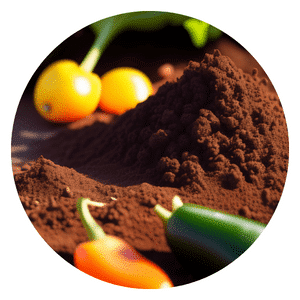How To Compost Sheep Manure
Sheep manure is a valuable resource that can be turned into nutrient-rich compost to improve soil fertility and enhance plant growth.
Composting sheep manure not only helps in waste management but also provides an organic alternative to chemical fertilizers.
However, composting sheep manure requires careful consideration of factors such as temperature, moisture content, and the addition of carbon-rich materials to create the ideal conditions for decomposition.
In this article, we will explore the step-by-step process of composting sheep manure, providing you with practical tips and techniques to successfully turn this waste product into a valuable asset for your garden or farm.
Sheep Manure Menu
Collect the manure
To begin composting sheep manure, it is crucial to gather the manure from your barn or pasture area. This can be done by regularly cleaning out the animal shelter or using a manure collector in the grazing field.
It is important to collect both the manure and bedding material, such as straw or wood shavings, for optimal composting.
Sheep manure contains valuable nutrients that can enrich your compost pile and improve soil fertility.
The mixture of manure and bedding material provides a good balance of carbon and nitrogen, essential for successful decomposition.
The bedding material helps absorb excess moisture from the manure, preventing it from becoming too wet and compacted.
When gathering sheep manure for composting, ensure that you are using fresh waste rather than old or decomposed piles.
Fresh manure contains higher levels of nitrogen, which aids in breaking down organic matter more efficiently.
Additionally, make sure to avoid including any non-organic materials like plastic bags or metal scraps in your collection to maintain a healthy compost pile free from contaminants.
Overall, collecting both sheep manure and its accompanying bedding material is an essential step towards successfully composting this organic waste product.
By ensuring a proper balance of carbon and nitrogen in your pile through this mixture, you can create nutrient-rich compost that will benefit your garden or farm soil in the long run.
Choose a composting site
When it comes to choosing a composting site for sheep manure, there are a few key factors to consider.
Firstly, selecting a suitable location is crucial.
It is important to choose an area that is well-drained and receives adequate airflow. This will help prevent excessive moisture buildup and promote proper decomposition of the manure.
In addition to good drainage and airflow, easy access for adding materials and turning the compost is essential.
You want to ensure that the site you choose allows for convenient addition of fresh sheep manure as well as regular turning of the compost pile or bin. This will help maintain proper oxygen levels within the pile, which is necessary for successful decomposition.
Another option to consider is using a compost bin specifically designed for sheep manure composting.
These bins typically have features that enhance airflow and allow for easier turning, making the process more efficient. They also offer containment, which can help control odor and keep pests away from your compost pile.
Overall, selecting a suitable location with good airflow, drainage, and easy access is vital when composting sheep manure.
Whether you choose a designated spot in your garden or opt for a specialized compost bin, ensuring these key elements will greatly contribute to successful decomposition and ultimately result in nutrient-rich compost for your plants’ health and growth.
Create the compost pile
Once you have formed a base layer of carbon-rich materials, the next step in composting sheep manure is to add a layer of sheep manure on top.
Sheep manure is an excellent source of nitrogen, which is essential for the breakdown of organic matter in the compost pile.
The high nitrogen content in sheep manure helps to speed up the decomposition process and promotes healthy microbial activity.
When adding the layer of sheep manure, it is important to ensure that it is evenly distributed over the base layer. This will help to maintain a balanced ratio between carbon-rich materials and nitrogen-rich sheep manure, which is crucial for successful composting.
Additionally, make sure that the sheep manure is well-rotted or aged before adding it to the compost pile.
Fresh or unaged manure can contain harmful bacteria and pathogens that can contaminate your compost.
By following these steps and properly incorporating sheep manure into your compost pile, you will create a nutrient-rich fertilizer that can be used in your garden or flower beds.
Composting not only reduces waste but also improves soil health and fertility by providing essential nutrients to plants naturally.
So don’t let that valuable resource go to waste – start composting your sheep manure today!
In verdant fields, where sheep mirthfully graze, The secret of nature's embrace we praise. Compost and manure blend with organic art, Enriching the soil where vegetables start. Through gentle hands, our garden we tend, As bounteous harvests grow, without end. Oh, sacred cycle, in these fruits we trust, Compost sheep manure—nature's fertile thrust.
Chappy The Gardener
Layer with organic materials
Another effective method for composting sheep manure is to layer it with other organic materials.
By alternating layers of sheep manure with kitchen scraps, grass clippings, or garden waste, you can create a well-balanced compost pile. This layering technique helps maintain a balanced carbon-to-nitrogen ratio, which is essential for successful decomposition.
Sheep manure alone may have a high nitrogen content, which can lead to an imbalance in the compost pile.
However, by adding additional organic materials rich in carbon like kitchen scraps or grass clippings, you can create the ideal conditions for microbial activity and decomposition.
The carbon-to-nitrogen ratio should ideally be around 30:1 to ensure efficient breakdown of organic matter.
Layering the sheep manure with other organic materials also helps improve airflow within the compost pile. This allows oxygen to reach the microorganisms responsible for breaking down the organic matter.
Adequate oxygen supply promotes aerobic decomposition and prevents unpleasant odors associated with anaerobic decay.
Layering sheep manure with other organic materials such as kitchen scraps, grass clippings, or garden waste is a beneficial practice when composting.
It helps maintain a balanced carbon-to-nitrogen ratio and promotes proper decomposition by providing optimal conditions for microbial activity.
Additionally, this layering technique improves airflow within the compost pile and ensures efficient breakdown of organic matter.
Moisture management
Moisture management is an essential aspect of composting sheep manure effectively.
It is crucial to keep the compost pile moist, aiming for a consistency similar to that of a damp sponge. This moisture level helps create the ideal environment for microorganisms to break down the organic matter efficiently.
As sheep manure tends to have a high carbon-to-nitrogen ratio, maintaining adequate moisture levels ensures proper decomposition and prevents the pile from drying out.
During dry periods or in arid climates, it may be necessary to add water to the compost pile regularly. This will help compensate for natural evaporation and ensure that the microorganisms responsible for decomposition have enough moisture to thrive.
However, overwatering should be avoided as well.
Excessive moisture can lead to waterlogging, which hinders oxygen flow within the pile and creates anaerobic conditions detrimental to healthy decomposition.
Striking a balance between keeping the compost moist but not overly wet is crucial for successful sheep manure composting.
Keeping these principles of moisture management in mind when composting sheep manure will result in faster decomposition and higher-quality compost.
By maintaining a damp sponge-like consistency through regular watering during dry periods without overdoing it, one can create an optimal environment for beneficial microorganisms while preventing any potential issues associated with excessive watering or drying out of the pile.
Properly managing moisture levels contributes significantly to producing nutrient-rich compost from sheep manure that can enhance soil health and promote sustainable gardening practices.
Turn the compost pile
One important step in composting sheep manure is to regularly turn the compost pile every few weeks. This can be done using a pitchfork or garden fork, which helps to aerate the pile.
By turning the pile, you are allowing oxygen to reach the microorganisms responsible for decomposition, which accelerates the breakdown of organic matter.
In addition, turning also helps to mix the outer material with inner layers, ensuring that all parts of the compost are exposed to air and moisture.
Regularly turning the compost pile not only accelerates decomposition but also helps prevent odors.
When organic waste decomposes in an anaerobic environment (without oxygen), it can produce unpleasant smells such as ammonia or hydrogen sulfide.
By providing sufficient oxygen through turning, you create aerobic conditions that promote beneficial bacteria and fungi growth while minimizing odor production.
In summary, turning the compost pile every few weeks using a pitchfork or garden fork is crucial when composting sheep manure.
It aerates the pile, speeds up decomposition, and prevents odors from forming. This simple yet effective practice ensures that your composting process remains efficient and produces high-quality fertilizer for your garden or plants.
Monitor temperature and moisture
Monitoring the temperature and moisture levels is crucial when composting sheep manure.
Composting involves the decomposition of organic matter through microbial activity, which generates heat.
To ensure effective breakdown of the organic material, it is essential to maintain a temperature range of 130-150 F (54-66 C). This optimal temperature promotes the growth and activity of beneficial microorganisms that accelerate the composting process.
A compost thermometer can be used to monitor the internal temperature regularly. Insert it into different areas of the heap to get an accurate reading.
If the temperature falls below 130 F (54 C), it indicates insufficient microbial activity, potentially due to low moisture levels or inadequate aeration.
In this case, adding more water or turning the pile can help raise the temperature and reactivate decomposition.
Moisture content is another critical factor in successful composting.
The ideal moisture level ranges from 40-60%. Maintaining proper moisture ensures that microorganisms remain active and efficiently break down organic matter.
To check if your compost has sufficient moisture, grab a handful and squeeze it gently; if only a few drops of water come out, it’s at an adequate moisture level.
If it feels dry and crumbles easily, add water using a garden hose or sprinkle with rainwater until it reaches the desired consistency.
By monitoring temperature and moisture levels closely during sheep manure composting, you can create an optimal environment for decomposition and produce nutrient-rich compost for your garden or crops.
Composting time
When it comes to composting sheep manure, the composting time can vary.
Sheep manure is considered a “hot” manure, meaning that it has a high nitrogen content and breaks down quickly. However, the exact length of time needed for composting will depend on various factors.
If you have a small pile of sheep manure, with adequate moisture and temperature conditions, the composting process may take around three to six months.
On the other hand, if you have a larger pile or if your pile lacks proper moisture or temperature levels, it may take closer to a year for the sheep manure to fully decompose.
During the composting process, it is important to monitor the moisture levels regularly.
Sheep manure should be damp but not soaked. If your pile becomes too dry, you can add water to maintain optimal moisture levels.
Additionally, turning or aerating the pile every couple of weeks helps in speeding up decomposition and ensuring even breakdown of materials.
Keeping an eye on temperature is also crucial as higher temperatures promote faster decomposition.
Regularly checking these factors and making necessary adjustments will help ensure successful composting of sheep manure.
Once your sheep manure has gone through its composting journey and turned dark brown and crumbly in texture, you’ll know it’s ready for use in your garden or flower beds.
The finished compost should have no noticeable odor of fresh feces but instead possess an earthy aroma indicating its maturity.
Curing
Curing the finished compost is an essential step in the process of composting sheep manure.
After all the necessary ingredients have been mixed together and decomposition has taken place, it is important to let the compost cure for a few weeks before using it in your garden.
During this curing period, any remaining organic matter that may not have fully broken down will continue to decompose further, resulting in a more stable and nutrient-rich final product.
Allowing the compost to cure also helps to stabilize the nutrient content of the finished product.
As organic matter continues to break down during this period, nutrients such as nitrogen, phosphorus, and potassium become more readily available for plants to absorb. This ensures that when you finally use the cured compost in your garden, your plants will receive a well-balanced and consistent supply of nutrients.
By taking the time to properly cure your finished compost before using it in your garden, you are maximizing its effectiveness as a natural fertilizer.
The additional decomposition that occurs during this period enhances its nutrient content while also ensuring that any remaining organic matter has completely broken down. This allows you to create a high-quality soil amendment that will nourish your plants and contribute to their overall health and productivity.
Application
One of the most beneficial uses for composted sheep manure is as a natural fertilizer for your garden beds.
When applied to the soil, it releases essential nutrients like nitrogen, phosphorus, and potassium, which are crucial for plant growth.
These nutrients are slowly released over time, providing a steady supply to your plants throughout their growing season.
In addition to providing vital nutrients, composted sheep manure also helps improve the structure of the soil.
It acts as a binder, helping to hold particles together and create a more stable environment for roots to grow. This enhanced soil structure allows water and air to penetrate more easily, preventing waterlogging and promoting healthy root development.
Applying composted sheep manure is simple – just spread a layer of it around your plants or directly onto your garden beds.
Be sure not to apply too thickly as this can lead to excessive nutrient release or even burn plant roots.
For best results, mix the compost into the top few inches of soil before planting or use it as a mulch layer around existing plants.
Regular application will help maintain healthy soil fertility and promote vibrant plant growth in your garden.
Safety precautions
When it comes to composting sheep manure, safety precautions are essential to protect yourself from potential health risks.
One crucial practice is to always practice proper hygiene when handling the manure.
After working with sheep manure, it is important to wash your hands thoroughly with soap and warm water. This will help eliminate any harmful bacteria or parasites that may be present in the manure.
Additionally, it is highly recommended to avoid direct contact with the compost during the curing period.
Sheep manure needs time to decompose and become fully matured compost before being used in gardens or crops.
During this curing process, harmful pathogens can still be present in the compost, making it unsafe for direct contact without protective gear such as gloves or masks.
By following these safety precautions, you can ensure a healthy and safe environment while composting sheep manure.
Proper hygiene practices will minimize any potential health risks associated with handling animal waste and prevent contamination of your garden or crops with harmful pathogens.
Remember to always prioritize your safety and take necessary steps to protect yourself when working with sheep manure during the composting process.
Adjustments
Adjustments are an essential part of the composting process, especially when dealing with sheep manure.
In the case of a wet and compacted compost pile, it is crucial to introduce more carbon-rich materials like dry leaves or straw. These materials not only improve aeration but also help to balance the moisture content in the pile.
By introducing carbon-rich materials, air can circulate more freely, preventing anaerobic conditions that can lead to unpleasant odors and slow decomposition.
On the other hand, if the compost pile becomes too dry, it is important to moisten it by adding water.
Sheep manure contains a high nitrogen content which requires sufficient moisture for effective decomposition.
Adding water helps create an optimal environment for microorganisms responsible for breaking down organic matter into rich humus.
The amount of water added should be enough to ensure that the pile is damp but not overly saturated.
In conclusion, adjusting the moisture levels in a sheep manure compost pile is essential for successful decomposition.
Whether too wet or too dry, addressing these issues by adding appropriate materials or water respectively will help maintain an ideal environment conducive to efficient breakdown and transformation of organic matter into nutrient-rich compost suitable for gardening and agricultural purposes.
In conclusion, using composted sheep manure in organic gardening can greatly benefit the growth and health of vegetables.
The rich nutrient content and slow release of nutrients make it an ideal fertilizer for vegetable plants.
Additionally, the use of composted sheep manure helps to improve soil structure and water retention, leading to healthier plants with increased resistance to diseases and pests.
By incorporating this natural and sustainable form of fertilizer into our gardening practices, we can not only produce a bountiful harvest of delicious vegetables but also contribute to the overall health and well-being of our environment.
So why wait? Start composting sheep manure today and enjoy the rewards of a thriving organic vegetable garden.
Click To Grow
Helps Us Grow – Share If You Like
















